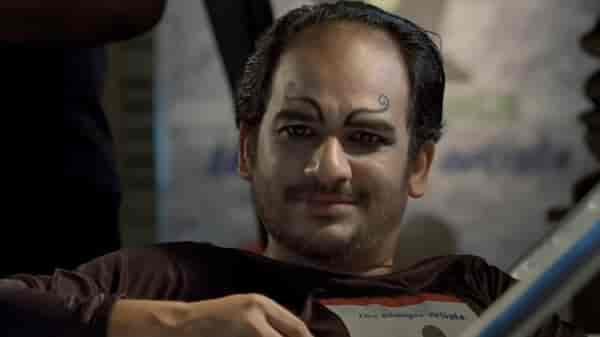The Hunger Artist review: Kamaleswar Mukhopadhyay’s short film is a mediocre version of a Black Mirror episode
Ritwick Chakraborty essays the role of Bhuthnath Malakar (Bhuto) in The Hunger Artist, which is based on a story by Franz Kafka

Last Updated: 09.52 AM, Apr 20, 2022
Story:
The story deals with a working class young man in his late twenties, Bhuto, who regularly sits on hunger strikes protesting against international incidents of violence and political agendas.
He gets used to tolerating hunger for days as the occurrences of violence are so very frequent.
A street-smart business-minded friend, called Ghona, picks him up as a prized pawn and can see 'a hunger artist' in him and asks him to sell his agenda as a 'reality show product' package. Bhuto agrees to bow down to the capitalist demons but it fails eventually.
Review: Well, philosophy has had a PR issue for a few centuries now, and Black Mirror aimed to change that by depicting and spoon-feeding its relevance. The show answered big questions through simple exercises but also globally triggered the possibility that it can be achieved even if you’re not equipped to handle the mise-en-scène or philosophy at large. Phew!!
The Hunger Artist lacks to bridge the gap between utopia and reality. That’s the only bridge unfortunately, because the rest of it only hangs around the caricature (not acting) of the celebrated performer Ritwick Chakraborty. And it’s a grand miss. The elongated eyebrows of the protagonist fail to leave an impression because the dialogues are cheesy and baseless. Biswanath Basu, another great performer tries his best to achieve the unreachable and fails because the script is a disaster.
And eventually, the whole narrative turns into pathetic verbal diarrhea and a meaningless display of over smart storytelling.
Some unforeseen consequences ring to mind why it’s difficult to justify any action on consequentialist grounds but it’s nearly impossible to premeditate the final outcome. The hypothetical scenarios present you with an opportunity to paint a brand-new picture. The Hunger Artist fails exactly at that conjuncture.
The morals that Franz Kafka’s A Hunger Artist illustrate are the dangers of pride and an artist’s ineffectiveness as an agent of social or cultural change that eventually lead to his endless dissatisfaction and closure. However, the narrative here attempts to paint the same picture but with a different and pathetic mindset.
The narrative fails to translate the cerebral effect and turns immensely verbal and over-the-top at times. The sets and lighting are exemplary but the tale is lost. The experience of invoking moral disgust and negative emotions clicks with the audience at large but the whole purpose of rephrasing a fabric of emotions doesn’t work at all.
Verdict: The Hunger Artist wishes to deal with a range of negative emotions or it helps us to recognise the moral wrongness of our actions as a society at large however it’s so diluted in its process that it confuses itself in the narration. It’s a really bad adaptation of a great creation.

 Premium
Premium